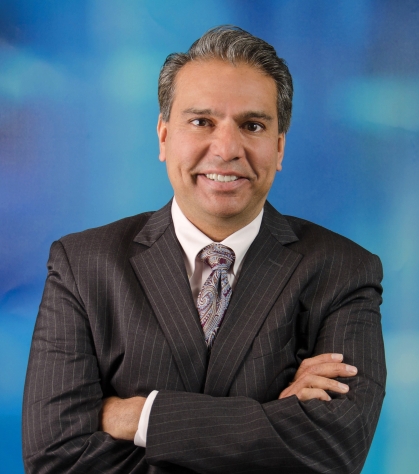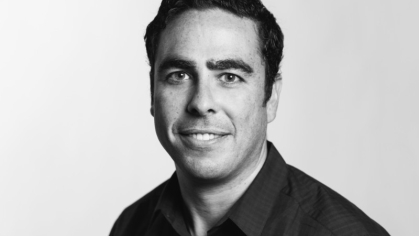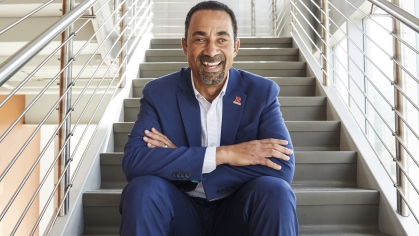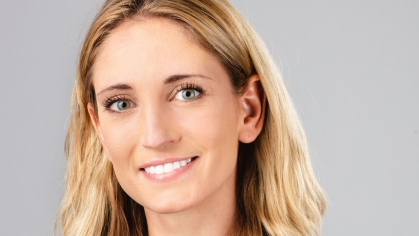
School of Engineering alumnus Tilak Lal has been elected to serve as the 2021-2022 chair of the Rutgers University Board of Trustees. Lal, who earned his BS in mechanical engineering from Rutgers, and his MS and MBA degrees from Georgia Institute of Technology and Columbia Business School respectively, is currently the head of investment risk management at Lighthouse Investment Partners, LLC, a global investment management firm. He has previously served as co-vice chair of the Rutgers Board of Trustees and as both a member and committee chair of the governing boards’ joint committee on investments. A resident of Half Moon Bay, California, he is also a member of the SOE Industry Advisory Board.
Why Rutgers?
I started following the 1975-76 Rutgers basketball team that made it to the N.C.A.A. Final Four. I thought, “Wouldn’t it be great to go there for college and watch basketball,” not at all thinking at the time about the academic undertaking that was in store for me. In those days before sports TV networks, I’d listen to the radio and read the Star-Ledger to see how the team did. These players were my heroes.
Fast forward to 2011, when I joined the board’s investment committee at Rutgers. Hollis Copeland, one of that basketball team’s best players who later played with the NY Knicks, served with me on that committee. That was a thrill of my life! I’m pretty sure I worked through some stage fright the first few times I spoke with Hollis.
College athletics can be a tremendous enhancement to a college education. If you look at someone like Hollis, or Rutgers president Jonathan Holloway, who played football at Stanford, you can see they are all-rounders – the type of people we want running our businesses and in other leadership positions. As President Holloway has said, athletes fail all the time in practice, yet they learn to pick themselves up and try again and again before they achieve success. This is great preparation for life.
Why mechanical engineering?
I just liked building things and always felt I was good at math. I’m not sure my professors agreed. But that’s how I felt.
An all-round education is so important. Mechanical engineering trains you in critical thinking. I’m in the investment area. It’s not uncommon to find engineering graduates progressing in their careers not only as practicing engineers, but also as doctors, investment managers, and lawyers, as well as in many other professions.
What do you most value about your Rutgers education?
I’ve really valued the community that Rutgers has been for me from the day I first walked on campus through today.
Athletics is a big part of that – it gives you a way to connect with others and plays a big part in burnishing the community feel.
Rutgers has always been a part of my family and as a large school we have a large alumni base. I’ll walk around the hiking trails near my neighborhood in California wearing my Rutgers swag and inevitably I’ll greet someone who has a connection with Rutgers – or with another Big 10 university. Such connections are fun and exciting to us as Rutgers graduates, since we’re relatively new to the Big 10.
How has your education contributed to your career success in investment risk management?
First of all, my MBA studies were a breeze after engineering at Rutgers. Any engineer who has gotten an MBA will agree with that. I’ll go one step further. I tell engineering students that wherever you go in your career, you’re likely to be one of the smartest people in the organization. And by the way, that’s not enough!
You need to carry humanities and liberal arts skills with you. And you need to be able to communicate, listen, and advocate. These are qualities beyond the critical thinking skills you will have mastered as an engineering graduate. Communication is a particularly important skill for engineers who often need to translate ideas from a conceptual or technical realm to plain-spoken English. The engineers who do that well will be fabulously successful.
Why has it been important to you to give back to RU and SOE through board service?
I don’t see my service as giving back. I’ve always loved this university and want to be a part of its mission in any way I can. Both the school and the university have given me that opportunity.
Rutgers recently announced it will divest from fossil fuels. How does this decision reflect institutional values?
What the board has done in divesting from fossil fuel companies sits side-by-side with the university’s commitment to sustainability and climate resilience.
Divestment should not be taken lightly and should occur very rarely, and only after thorough vetting. By the way, Rutgers has shown leadership in divesting in our past. In 1985, Rutgers responded to a student initiative, becoming the first university endowment to divest from South Africa’s apartheid regime. And on the point of thorough vetting, it took the university and its board about seven years to come to that decision.
A student-led request in 2015 to divest fossil fuels prompted the development of a divestment policy recommendation. Did students spur the current move to divest?
In February 2020, a divestment request was made by the Endowment Justice Collective, a student led group. However, the discussions and deliberations among students, faculty, administration, and board members on the matter had had already been under way for several years prior to that. The Board of Governors and Board of Trustees approved the recommendation to divest from fossil fuels in March of 2021. The divestment, which is specifically from fossil fuel exploration and extraction companies, will be phased in over ten years. To insure transparency, the endowment’s investment office will issue annual progress reports.
The university’s divestment action is not tacitly or otherwise blaming any individual or industry for climate change. This is a predicament we’ve gotten ourselves into as a society. There are many very dedicated people, including engineers in fossil fuel companies, working on solutions to climate change. We can’t use the climate change crisis to label people as good guys or bad guys. We can only solve this massive challenge as a collective.
As the new chair of the university board of trustees, do you have any specific goals in mind?
This university – and all universities – are going through financial strains right now and the next few years are a stress test. That’s the highest priority not just for me, but also for everyone on the board and in the administration.
Has the coronavirus pandemic affected your outlook?
The pandemic has been a tremendous disruption – but from disruptions come opportunities. As a university, we need to look at things from both sides: how to weather the storm while simultaneously identifying new opportunities for the future of higher education.
Is there anything you know now that you wish you’d known as an entering SOE student?
I have two pieces of advice and, on the surface, they may seem contradictory.
First piece of advice: at orientation your circle of friends will be students in a broad variety of majors. Don’t let that fool you. When classes start, most of your friends will ease into the transition, perhaps with a few assignments here and there. You, on the other hand, will go from 0 to 100 miles per hour in one day. Some of my engineering friends weren’t mentally ready for that and weren’t able to dig out of the hole they got into after falling behind.
Second piece of advice: Your grades do not determine how good an engineer you will be. The best engineers are the ones who love building, breaking, and fixing things.
What did you do for fun as a student? Did you go to basketball games?
Yes, I did. Both basketball and football games were fun. Football was easier since the games were on Saturdays. I have vivid memories of the day we played #1 Alabama in football – and almost won!
I’ve been a diehard Rutgers sports fan since I was in high school. Other than last season, when fans weren’t allowed into the stadium, I’ve attended every home football game since 2005. And yes, I’ve gotten very creative in scheduling client meetings and family get-togethers on the east coast around our football schedule.
What do you do for fun these days?
My wife and I just moved from San Francisco to a small coastal town about 20 miles south of the city. I recently got my first bike since I was a child. I now bike coastal trails just about every day. I feel really blessed to be able to do that during a pandemic. Just like I remember biking as a kid, except I go around the puddles now.
If you could travel freely and go on a vacation tomorrow, where would you go?
With the end of the pandemic in sight, that question is on everyone’s mind. Some might laugh at my answer. New Jersey!. I have so many family and friends in the tri-state area who I haven’t seen in over a year. I have one adorable two-year-old nephew in New York who has had both of his birthdays during the pandemic. I’ve developed a serious case of FOMO. And yes, I do plan to go to every Rutgers home football game this year!


